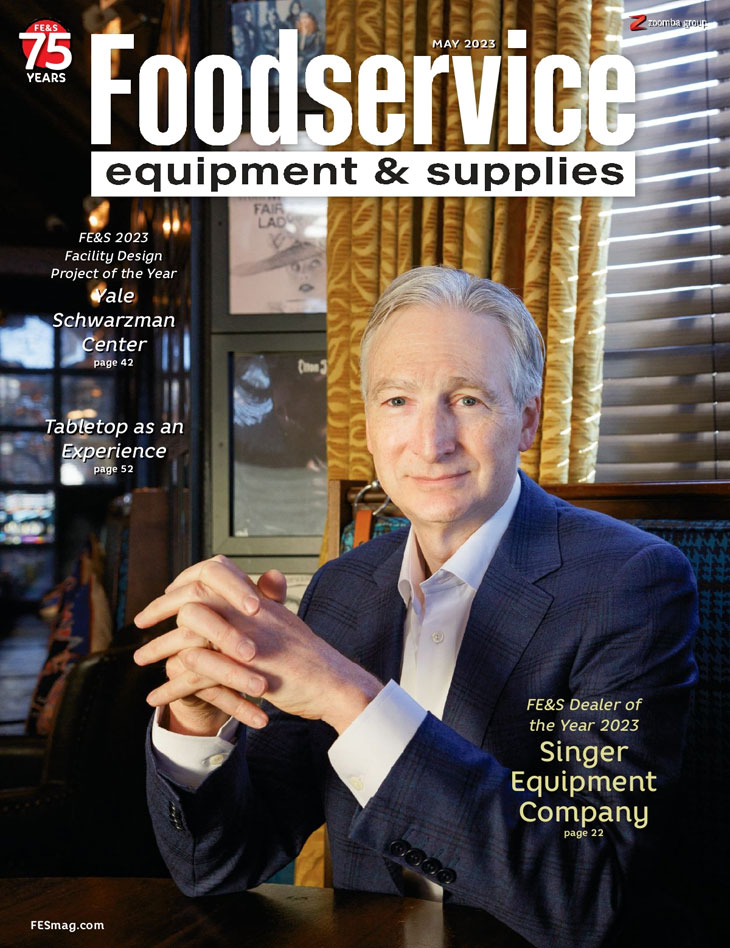Artificial Intelligence has revolutionized numerous industries, and foodservice will be no exception.
As an industry we have been focusing on trying to automate physical tasks and that is happening, but at a slow rate. The power of AI could have a big industry impact in some other areas. With its ability to analyze large amounts of data, learn from patterns, and make intelligent decisions, AI is transforming various aspects of foodservice operations. From improved decision-making processes to enhancing customer experiences and optimizing supply chain management, the implementation of AI technologies shows big potential to enhance efficiency, reduce costs, and drive innovation in the foodservice industry.
Enhancing Efficiency and Automation
AI technologies excel at automating routine tasks and optimizing processes, significantly enhancing efficiency in foodservice operations. For instance, AI-powered chatbots and virtual assistants can handle customer orders, and provide personalized recommendations, reducing the need for a person to take orders. Additionally, AI algorithms can analyze historical sales data, customer preferences, and other relevant factors to generate accurate demand forecasts. This should enable restaurants to optimize cooking levels, minimize food waste, and ensure that the right items are available at the right time.
Personalizing Customer Experiences
AI-powered systems can also utilize natural language processing to understand and respond to customer orders. Through the analysis of customer data and behavior patterns, AI algorithms can provide highly personalized recommendations, menu suggestions, and promotions tailored to individual preferences. This not only enhances customer satisfaction but also drives sales and customer loyalty.
Furthermore, AI-enabled systems can leverage computer vision technology to enable seamless and frictionless experiences matching cars or front counter customers with their orders. Additionally, facial recognition technology can personalize the dining experience by recognizing regular customers, their preferences, and dietary restrictions, leading to a more personalized and efficient service.
Optimizing Supply Chain Management
AI plays a crucial role in optimizing supply chain management for foodservice operations. By analyzing historical sales data, AI algorithms can generate recommended orders for managers to place. This helps businesses optimize inventory levels, reduce food waste, and ensure timely replenishment, ultimately minimizing costs and improving operational efficiency.
AI-powered systems can also enhance food safety and traceability. By monitoring and analyzing data from various sources, such as supplier records, transportation routes, and temperature sensors, AI can detect potential risks and ensure compliance with safety regulations. In the event of a food safety issue or recall, AI can rapidly trace the affected products, minimizing the impact on customers and preventing potential health hazards.
Optimizing Labor Scheduling
AI can optimize labor scheduling in a restaurant by leveraging data analysis and predictive modeling techniques to match employee availability with demand accurately. Here's how AI can help in optimizing labor scheduling:
- Demand forecasting: AI algorithms can analyze historical sales data, customer traffic, seasonality, and other factors to accurately forecast demand for specific time periods. By understanding patterns and trends, AI can predict peak hours, busy days, and periods of low demand, enabling managers to adjust staffing levels accordingly.
- Schedule creation: If the system is fed the labor requirement for sales or transactions, AI can provide recommendations for optimal staffing levels based on historical data, business objectives, and constraints. It can consider factors like employee preferences, availability, and skill sets to create optimal schedules that align with business needs and employee satisfaction. AI can utilize optimization algorithms to generate optimal labor schedules by considering various constraints and factors. These algorithms can account for labor laws, employee preferences, shift length, and labor cost targets to create schedules that cover peaks while keeping costs to a minimum.
- Real-time monitoring: AI-powered systems can monitor real-time data, such as current sales, customer traffic, and table turn times, to make on-the-fly adjustments to the labor schedule. For example, if there is an unexpected surge in customer demand, AI can suggest additional staff or call-in extra support to avoid service bottlenecks.
- Schedule flexibility and employee empowerment: AI-powered scheduling systems can offer flexibility to employees by allowing them to swap shifts or request time off through a digital platform. AI algorithms can handle shift swapping requests, ensuring that staffing needs are still met while accommodating employee preferences and availability without overtasking the managers.
Other application of AI in food service could be:
- Food delivery services: Route optimization AI algorithms analyze real-time traffic data, historical delivery patterns, and other variables to optimize delivery routes, reducing delivery times and improving overall efficiency.
- Smart reservation systems: AI-powered reservation systems can analyze customer data, seating availability, and historical dining time patterns to optimize table reservations. These systems can predict no-show rates, allocate tables more efficiently, and manage waitlists effectively.
- Food safety systems: AI technologies monitor and analyze data from various sources, including temperature sensors, to ensure food safety and compliance. These systems can detect anomalies, identify potential risks, and provide real-time alerts to prevent foodborne illnesses.
The integration of artificial intelligence technologies in foodservice operations has ushered in a new era of efficiency, personalization, and optimization. Many of the future changes may focus on making it easier for an employee to make the right decision or no decision at all. Computers are great at analyzing and while they have been better than humans at Calculus for decades, they still cannot move as gracefully as we do.
AI offers significant benefits to the foodservice industry. Embracing AI-powered solutions enables businesses to stay ahead of the competition, reduce costs, and deliver exceptional service. As AI continues to evolve and mature, its potential to transform food service operations and shape the future of the industry is truly exciting.
And if you think AI does not know the restaurant industry, think again. ChatGPT was used to create the framework of this blog. At the same time, though, AI in foodservice is in its infancy, just as we all were early in our careers. And as AI becomes more widely accepted and implemented its ability to do more will only grow. Data processing, cross-referencing and data re-formatting can and will be taken to a whole different level in the very near future.




